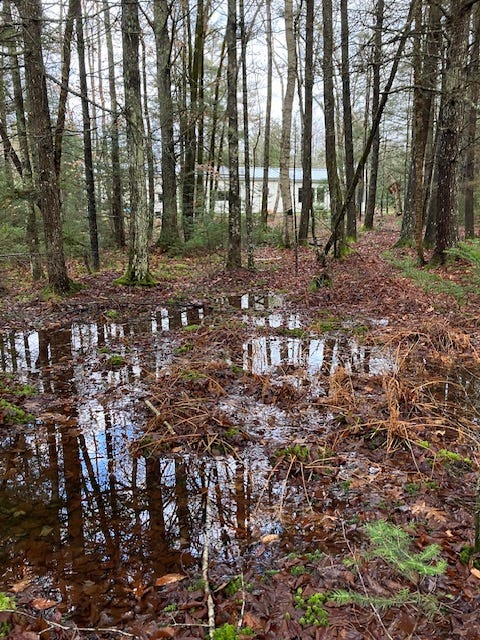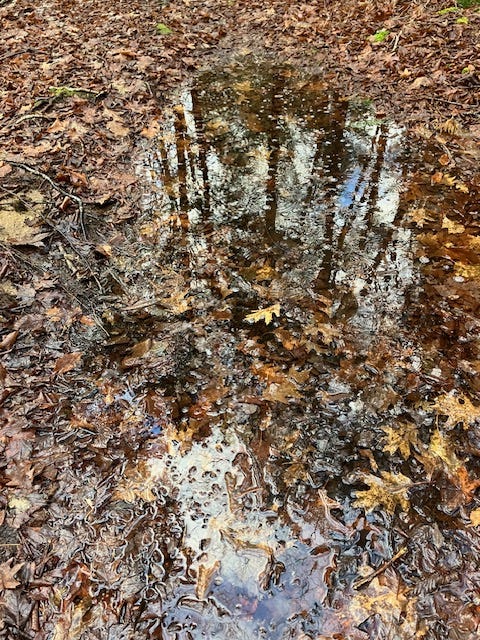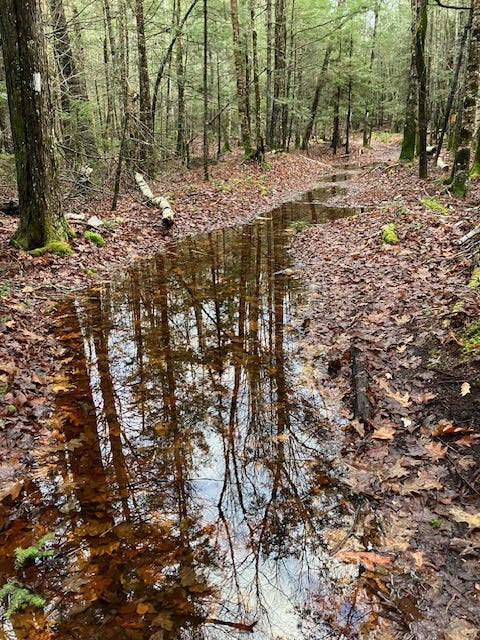A Power of Water
Nebizum
I should have read this sentence: “I don’t recommend starting your bird language studies in the middle of January in the state of Maine,” before I flung myself into the commitment to find a sit spot outside and daily tune my owl eyes and deer ears to the trees, the forest floor, the grassy lawn in my search for birds. It was last Monday, when around 10 am, I first went out to listen to birds in my experiment with greater attunement with the natural world.
The fury of rain and wind from the night before had passed, the sun was shining, and the temperature was, disturbingly, in the high forties. Because the ground was still frozen, there was water everywhere, little glistening pondlets bubbled in the low spots under the white pines or beside the moss-covered stumps. I sat for maybe ten minutes and didn’t hear a peep from anything feathered or for that matter furred. Nothing moved up a tree, nothing flew between trees. The birds that had flocked to my feeder at dawn that morning were resting somewhere, conserving their energy.
Jon Young, the author of that sentence about birdsong in Maine winters and of the book, What the Robin Knows (see last week’s blog) encourages his readers to pay attention to what’s provoked inside them while they are in their sit spot. First off, I must confess, I felt a bit impatient with the birds. Oh! my entitled human self. Then, silence still filling the air, I got bored and cast about for something else to move me. I noticed how drawn I was to the water pooling in those little rain-fed ponds. It was as if I’d gone to bed inside a dry forest and awakened in a newly born universe of water. My feet, restless under me, wanted to splash in those little ponds, to follow their trickle and flow, to be in water, to be water.
Quickly, I went inside, pulled on my high rubber boots and set out through the forest behind the house. I feared the water would be icy cold, but it was warm and welcoming on my feet. Bubbles exploded to the surface with each step and the sun, refracted in those bubbles, offered its morning lightshow. Underfoot the submerged still-green Christmas ferns and brocade mosses were soft and spongy. As I walked further, I saw that the ponds opened into little rivulets of water that ran into larger rivulets and streams.
And then the music started. Not bird music. Water music. An orchestra of water music performing its notes as it flowed over submerged granite boulders and downed trees. Water suddenly freed from a little dam behind a rock lets out a trumpet sound of joy as it rushes onward, until, certain of its freedom, it sighs a low note, happy to rest.
There’s a river that runs through our woods, aptly named the Little River. On Monday, the river was so high and wild it overflowed its banks. All the streams I crossed flow into the Little River which runs out to the ocean a few miles from these woods. It is there at its mouth that archeologists have found shell middens from the ancestors who roamed these woods for thousands and thousands of years. Water for the Abanaki is sacred. Indeed, the streams and springs that fed the Gulf of Maine for 11,000 years were renowned by the tribes for their healing powers. Nebi is the Abanaki word for water and Nebizum is the word for medicine.
And we are surely in need of medicine. There words from the author and naturalist Barry Lopez, taken from an essay he wrote in 2020 just months before his death, eloquently describes this moment:
“…we can no longer afford to carry on in a prolonged era of polite reflection and ineffective resistance. An Era of Emergencies is bearing down on us. We must consider, for example, how to organize the last industrial extractions of oil, fresh water, natural gas, timber, metallic ores, and the fish in order to ensure our own survival; …We must invent overnight, figuratively speaking, another kind of civilization, one more cognizant of limits, less greedy, more compassionate, less bigoted, more inclusive, less exploitative.” Embrace Fearlessly the Burning World.
“An era of polite reflection and ineffective resistance.” Lopez is addressing the need for change at a much deeper level, a feeling I share after two years of community organizing—politely. A few days ago I attended an online webinar, “The History of Nonviolence from Thoreau to Tolstoy to Gandhi,” the first of three webinars presented by Bill McKibben and Third Act on the history and principles of non-violent protest. After listening to the webinar, I signed up to travel to Washington, DC, in February, for protests against the massive LNG buildout Biden’s administration has slated for the next years. I checked the box that said I was willing to be arrested.
My impolite passion, while nurtured by McKibben’s full-hearted endorsement of non-violent action and strengthened by the terrifying data science has mounted about this Era of Emergencies—it is not born of those things. Rather it is born of my time spent splashing in those pondlets lush with mosses and ferns, from following streams and listening to their orchestral performances, and, too, from those sleepy, lazy birds. It rises out of love. It rises out of gratitude for all the nurturance and medicine offered me on my slosh through my newly underwater world.
And it rises from the deep empathy I feel for the creatures living in this warming Endangered World. Grandmother Woodchuck, a member of one of the few species in Maine that truly hibernates, will be confused by these warm winter temperatures we are having in Maine and come out of her den too early and, in all likelihood, will perish.





Yesterday we stood with 6 other elders by a stream that had its own unique sound. We were standing at the entrance to the new, wonderful, shop 'till you drop Costco store. It was a stream of jumbo sized pickup trucks and SUV's and it was the sound of carbon being emitted. A thousand shopper's faces looking at the impolite geezers having the gaul to suggest that the Costco -Citibank marriage was fueling the destruction of the planet.
Bravo, Kathleen! The photos and reflections (pun intended!) are wonderful! Thank you!